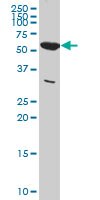ST1589 Anti-PKM2 Mouse mAb (5D2-3B3)
Productos recomendados
Descripción
| Replacement Information |
|---|
Tabla espec. clave
| Host |
|---|
| M |
| References |
|---|
| Product Information | |
|---|---|
| Form | Liquid |
| Formulation | Undiluted ascites |
| Positive control | HeLa cells |
| Preservative | None |
| Biological Information | |
|---|---|
| Immunogen | PKM2 |
| Clone | 5D2-3B3 |
| Host | Mouse |
| Isotype | IgM |
| Physicochemical Information |
|---|
| Dimensions |
|---|
| Materials Information |
|---|
| Toxicological Information |
|---|
| Safety Information according to GHS |
|---|
| Safety Information |
|---|
| Product Usage Statements |
|---|
| Packaging Information |
|---|
| Transport Information |
|---|
| Supplemental Information |
|---|
| Specifications |
|---|
| Global Trade Item Number | |
|---|---|
| Número de referencia | GTIN |
| ST1589 | 0 |








